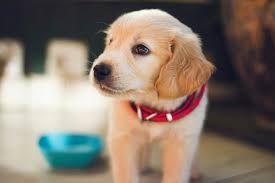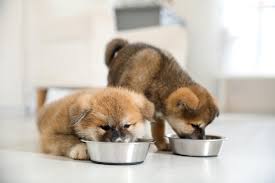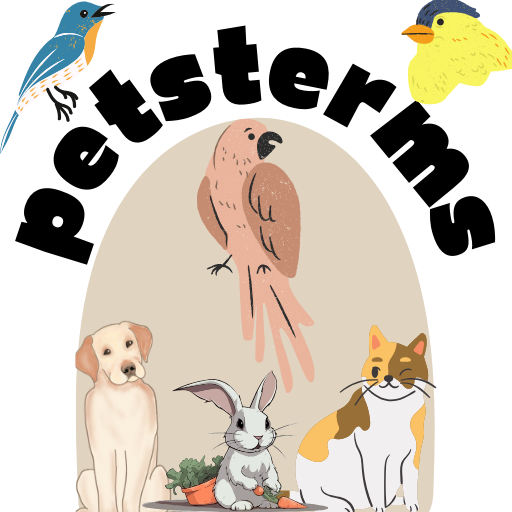Introduction
Changing your puppy’s diet may seem like a simple task, but it is important to carefully manage the change to avoid digestive problems. Puppies, with their delicate digestive systems, can react badly to sudden changes in their diet. A gradual transition allows your puppy to adjust well to the new food, while keeping him healthy and happy during the process.

Understanding puppy meltdowns
How the Puppies Digestive System Works
Dogs have digestive systems that are still developing. Their intestinal flora, the beneficial bacteria that aid in digestion, need time to adjust to the new food. Rapid changes can upset this balance, causing digestive problems.
The influence of young puppies
Young puppies are especially sensitive to changes in diet. Their intestines are more sensitive and sudden changes in their diet can cause problems such as diarrhea, vomiting or gas.
Common digestive problems
When puppies suffer from digestive problems, they often exhibit symptoms such as loose stools, frequent bowel movements, or abdominal discomfort. These problems can be caused by dietary changes or underlying medical conditions.
Why sudden diet changes are problematic
A sudden change in diet can upset your puppy’s digestive system, which isn’t quite ready for the new mix. Bacteria need time to change, without this change time, digestive problems can occur.
Effects on gut bacteria
The formation of toxic bacteria is important for good digestion. Introducing new foods too quickly can upset this balance and cause digestive problems. Gradual change helps to maintain this balance and avoid problems.
Symptoms of digestive problems
Watch for signs such as diarrhea, vomiting, or refusal to eat the new food. These symptoms indicate that your puppy’s digestive system may be having trouble making the transition.
When to change your puppy’s food

Why you should change your puppy’s diet
There are many reasons to change your puppy’s diet. Understanding them can help you make the change at the right time and for the right reasons.
Growth and development stage
As your puppy grows, his nutritional needs change. Puppy food is designed for growth and development, but as they grow, they may need different formulas to meet their new nutritional needs.
Food needs and allergies
If your puppy has food allergies or sensitivities, switching to a hypoallergenic or limited-edition food can help reduce symptoms such as itching, digestive problems, or skin problems.
Vet Advice
Your vet may recommend changing your puppy’s diet for various health reasons, including weight management or meeting nutritional needs. Always follow your veterinarian’s advice for best results.
Determine the transition period
When you start
Start transitioning when your puppy is strong and stable. Avoid introducing changes during stressful times, such as after vaccinations or if your puppy is sick.
Check your puppy’s health
Keep an eye on your puppy’s health during transitions. Look for any signs of anger or behavioral changes and adjust the change plan if necessary.
A step-by-step process for diet change
A process of 7 to 10 days
Daily change plan
Start by mixing a little of the new food with your puppy’s existing food.
Gradually increase the amount of new food over a period of 7 to 10 days:
Days 1-2: 25% fresh food and 75% old food
Days 3-4: 50% fresh food and 50% old food
Days 5-6: 75% fresh food and 25% old food
Days 7-10: 100% fresh food
How to mix old and new food
Mix the ingredients well to ensure even distribution. This helps your puppy get to know the new flavors and textures while still retaining the familiar taste of the old food.
Monitoring and maintenance
Check for digestive problems
Keep an eye on your puppy’s stool and general health. If you notice digestive problems, limit the change or contact your veterinarian.
Adjust parts as needed
When switching to a new food, adjust portion sizes based on the caloric density of the new food. Make sure your puppy gets the right amount of food without overfeeding.
Choosing the right food for your puppy
Choosing puppy food is very important
Nutrition
Puppy food should meet nutritional needs, including high levels of protein, fat, and vitamins and minerals necessary for growth and development.
Don’t miss out
Choose foods with high protein sources (such as chicken or lamb) and avoid filling foods such as corn or soy. Whole grains and vegetables are good additions to a balanced diet.
Understanding food labels
Source of protein
Look for the protein source by name (like “chicken” instead of “meat products“) and see that protein is listed as one of the main ingredients.
Avoid fillers and additives
Avoid foods with lots of fillers, artificial colors or preservatives. These can contribute to digestive problems and provide little nutritional value.
Common mistakes to avoid
Make a change
The risk of rapid change
Changing food too quickly can cause digestive problems. It is important to make changes gradually to give your puppy’s digestive system time to adjust.
The need for incremental change
Gradual changes help your puppy’s intestinal flora adapt to the new food, reducing the risk of digestive problems and ensuring a smooth transition.
Introduce multiple changes at once
Effects on digestion
Introducing new foods, treats or supplements all at once can overload your puppy’s digestive system. Keep changes to a minimum to avoid confusion and stress.
Limit changes
Focus on diet changes first before introducing other changes. This way, you can better understand the cause of any possible problem.
Management of digestive problems
Identify the symptoms of distress
Signs of diarrhea, vomiting and discomfort
Common symptoms of digestive problems include diarrhea, vomiting, gas, and abdominal discomfort. If these symptoms occur, it is important to treat them quickly.
Treatment for mild problems
Temporary food preparation
If your puppy is having mild digestive problems, try changing his diet for a while. Add plain rice or boiled chicken to calm his stomach.
Continuous hydration
Make sure your puppy stays hydrated, especially if he has diarrhea or vomiting. Give him fresh water regularly and monitor his hydration levels.
Contact a veterinarian
When to seek advice from an expert
If your puppy’s digestive problems persist for more than a day or two, contact your veterinarian. Persistent problems may indicate food allergies or other health problems.
Special meals may be available
Your vet may recommend a special diet if your puppy has special dietary needs or sensitivities. Follow her advice to ensure the health and well-being of your puppy.
Portion control during change
Arrange portions based on fresh foods
Calorie density and portion size
Fresh foods can have different calorie density, which affects portion sizes. Groom your puppy to keep it looking good.
Feelings of overeating or overeating
Managing your puppy’s weight
Avoid overeating or snacking by following the recommended serving size on fresh food packaging. Monitor your puppy’s weight and adjust portions as needed.
Make sure you eat the right foods
Make sure your puppy gets the right amount of nutrition in his new diet. Contact your veterinarian if you have any concerns about his diet or general health.
Hydration and nutrition changes
The need for hydration
The role of water in digestion
Water aids digestion and helps prevent constipation. Make sure your puppy has access to fresh water at all times, especially during feeding changes.
Signs of dehydration
How to find the right liquid
Check for signs of dehydration, such as dry gums or droopy eyes. Encourage your puppy to drink more water if you notice signs of dehydration.
Special considerations for sensitive years
Find out which years are sensitive
Common symptoms
A sensitive stomach may have symptoms such as diarrhea, vomiting, or excessive gas. If your puppy has a sensitive stomach, you’ll want to choose his food carefully.
Choose foods that are easy to digest
Stomach friendly ingredients
Look for foods that contain fast-digesting protein and simple carbohydrates. Limited mixes or grain-free options may be beneficial for puppies with sensitive stomachs.
Long-term food management
Maintain a consistent diet
Avoid frequent food changes
Once the transition is complete, avoid changing your puppy’s food too often. Consistency helps maintain digestive health and overall well-being.
Adapt to your puppy’s growth
Adaptation to adult nutrition
As your puppy grows, his nutritional needs will change. Plan to switch to adult food when your veterinarian recommends it and follow a gradual process like the first switch.
Management of food refusal
Causes of food refusal
No interest or interest
Dogs may refuse new foods because of taste or texture preferences. Be patient and persistent in encouraging them to try the new food.
Strategies to encourage children to eat
Make food more delicious
Try to make the food a little hotter or add a little bit of their favorite food to make it more delicious. Avoid using too many treats to avoid junk food.
Conclusion
Changing your puppy’s diet can be a gentle process if done slowly. By following a structured plan, monitoring your puppy’s health, and choosing the right food, you can ensure a smooth transition without upsetting his stomach. Always be patient and contact your veterinarian if problems arise.
Questions
How long will it take me to change my puppy’s food?
A gradual transition over 7 to 10 days is recommended to minimize digestive issues and help your puppy adjust.
What should I do if my puppy has diarrhea?
Reduce the change and make temporary food changes like plain rice or boiled chicken. If diarrhea persists, contact your veterinarian.
Is it okay to mix different types of puppy food?
Mixing different types is often good, but make sure that the foods are suitable and change gradually to avoid digestive upset.
How often can I change my puppy’s food?
Frequent changes are not recommended. Keep a consistent diet and make changes only when necessary or advised.
Should I call the vet before I change my puppy’s food?
Yes, especially if you have concerns about allergies, sensitivities or special dietary needs. Your vet can advise you on the best diet for your puppy.

